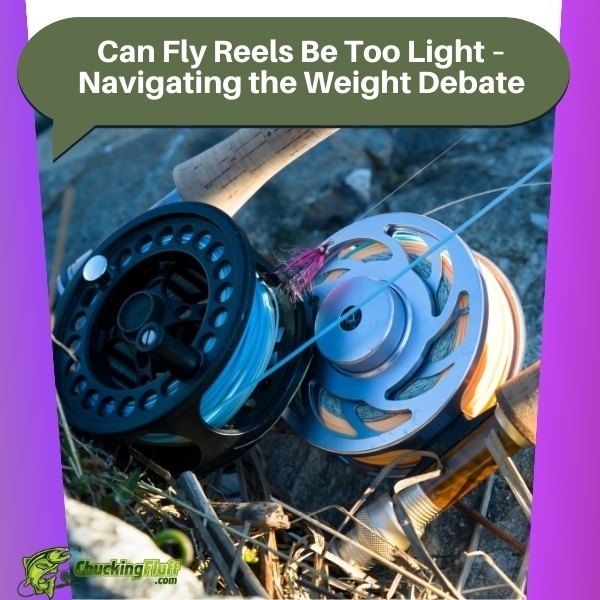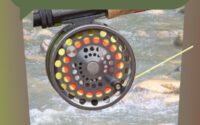| Disclosure: Just to be open and honest the buttons and links you click on in the website will in most cases take you to another website where you can purchase the products I am reviewing. As an Amazon Associate I earn from qualifying purchases. |
Can Fly Reels Be Too Light – Navigating the Weight Debate:

Fly fishing is a delicate balance between art, technique, and equipment. Among the crucial pieces of gear is the fly fishing reel, which plays a significant role in the overall fishing experience. However, anglers often wonder whether a fly fishing reel can be too light. In this article, we delve into this question, exploring the intricacies of reel weight and its impact on fishing performance.
Quick Post Navigation
Introduction
Definition of fly fishing reels
In fly fishing, the reel is a vital component of the setup, responsible for storing and deploying the fishing line. Unlike traditional reels used in baitcasting or spinning, fly fishing reels are designed to facilitate delicate presentations and smooth drag systems.
Importance of reel weight in fly fishing
The weight of the fly fishing reel can significantly influence casting accuracy, line control, and overall fishing experience. While lighter reels offer advantages in certain scenarios, they may also present drawbacks that anglers need to consider.
Factors affecting fly fishing reel weight
Fly rod weight
The weight of the fly rod plays a crucial role in determining the ideal reel weight. Matching the reel weight to the rod weight ensures proper balance and optimal performance during casting and retrieval.
Fishing conditions
Different fishing conditions, such as water depth, current speed, and wind strength, can impact the suitability of reel weight. Anglers must assess these factors to choose a reel that can handle the prevailing conditions effectively.
Targeted fish species
The size and behavior of the targeted fish species influence the choice of reel weight. Lighter reels may be suitable for smaller freshwater species, while heavier reels may be necessary for larger saltwater gamefish.
Pros of using lighter fly fishing reels
Increased sensitivity
Lighter reels enhance the sensitivity of the setup, allowing anglers to detect subtle strikes and movements more effectively. This heightened sensitivity can result in quicker hook sets and increased catch rates.
Reduced fatigue
Lightweight reels contribute to a more balanced and ergonomic fishing setup, reducing fatigue during long casting sessions. Anglers can fish for extended periods without experiencing strain or discomfort, improving overall enjoyment on the water.
Improved casting accuracy
The reduced weight of the reel facilitates smoother casting motions, resulting in improved accuracy and distance. Anglers can achieve precise presentations with minimal effort, making it easier to target specific areas and entice fish.
Cons of using lighter fly fishing reels
Reduced line capacity
Lighter reels typically have smaller spool capacities, limiting the amount of fishing line that can be accommodated. This restriction may pose challenges when targeting large or fast-moving fish that require ample line for extended runs.
Decreased durability
Lightweight construction materials used in some fly fishing reels may compromise durability, especially when subjected to rigorous use or rough handling. Anglers risk premature wear and potential damage to the reel under demanding conditions.
Limited use in windy conditions
In windy conditions, lighter reels may struggle to provide sufficient resistance against the force of the wind, affecting casting accuracy and line control. Anglers may find it challenging to maintain control over their presentations and effectively manage line drift.
Finding the right balance
Matching reel weight with rod weight
Anglers should aim to achieve a balanced setup by selecting a reel that complements the weight and action of their fly rod. Proper balance ensures optimal performance and casting efficiency across a range of fishing scenarios.
Considering personal preferences
Individual preferences and fishing styles play a significant role in reel selection. While some anglers may prioritize sensitivity and lightweight design, others may prioritize durability and line capacity based on their fishing preferences and target species.
Seeking advice from experienced anglers
Novice anglers can benefit from seeking advice and recommendations from experienced fly fishermen. Knowledgeable anglers can provide valuable insights into reel selection based on their firsthand experiences and expertise.
Conclusion
Fly fishing reels can indeed be too light in certain situations, leading to compromises in performance and durability. While lighter reels offer advantages such as increased sensitivity and reduced fatigue, they may also have limitations such as reduced line capacity and decreased durability. Anglers must carefully consider various factors, including rod weight, fishing conditions, and target species, to strike the right balance between weight and functionality in their reel selection.
FAQs
Q) Can I use a lightweight fly fishing reel for saltwater fishing?
A) While lightweight reels can be suitable for smaller saltwater species, they may lack the durability and line capacity required for larger gamefish. It’s essential to consider the specific requirements of saltwater fishing and choose a reel that can withstand the challenges of marine environments.
Q) Are there any advantages to using a heavier fly fishing reel?
A) Heavier reels typically offer greater line capacity and durability, making them suitable for targeting larger fish or fishing in demanding conditions. Anglers who prioritize these attributes may prefer heavier reels for their versatility and reliability.
Q) How can I determine the ideal reel weight for my fly rod?
A) The ideal reel weight should complement the weight and action of your fly rod, ensuring proper balance and performance. Consult with the rod manufacturer’s recommendations or seek advice from experienced anglers to select a reel that matches your rod specifications.
Q) Do lightweight fly fishing reels require special maintenance?
A) While lightweight reels may be constructed using advanced materials to reduce weight, they still require regular maintenance to ensure optimal performance and longevity. Routine cleaning, lubrication, and inspection of components are essential to prevent corrosion and prolong the lifespan of the reel.
Q) Can I use a lightweight fly fishing reel for casting heavy flies?
A) Lightweight reels may struggle to provide sufficient line control and drag pressure when casting heavy flies, especially in windy conditions. Anglers targeting larger fish or using bulky flies may benefit from using a reel with a more substantial design to handle the added weight and resistance effectively.


